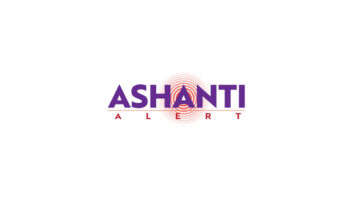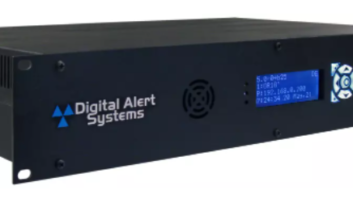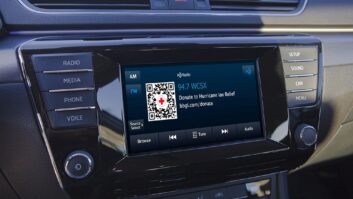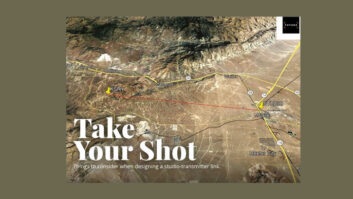(click thumbnail)Matthew Straeb of Global Security Systems, left, and P.S. Sundara of Technomedia India and Alert-FM discussed alerting products at NAB2007.Credit: Photo by Jim PeckJACKSON, Miss. A company developing digital emergency alert technology is focusing its efforts first on hurricane-prone states, hoping success in these areas could lead to national implementation of its system.
Global Security Systems, which launched its GSSNet All-Hazards Digital Alert System in Mississippi in 2006, has announced intentions for a similar system in Alabama. Florida broadcasters have expressed interest in the technology.
After tornados struck central Florida in the pre-dawn in early February, Pat Roberts, president of the Florida Association of Broadcasters, told the Orlando Sentinel newspaper that he would recommend the board help GSS “get their system going because it relies on the most widely available platform in the world: FM radio. I’m supportive of multiple ways of public warning, but I still believe in old-time radio,” said Roberts, who chairs Florida’s Emergency Communication Committee.
Proponents of the GSS plan say the company’s digital alert system remains robust in the critical initial hours after an emergency by using FM subcarrier frequencies when other communication systems, such as cell phone towers, become overloaded.
Tornado deaths
Elsewhere, the board of the Alabama Broadcasters Association has approved a resolution endorsing a statewide emergency notification network using the GSSNet system. For now, participants would include the Cox Radio cluster of stations in Birmingham, Ala., and Williams Communications group in Anniston, Ala., and possibly other radio stations, said Sharon Tinsley, executive director of the Alabama Broadcasters Association.
“We like what GSS is doing and think the FM broadcasters in the state are excited about getting behind the project. We are in the very early stages at this point,” Tinsley said.
After a tornado killed eight teenagers at a high school in Enterprise, Ala., in March, Tinsley expects the state will go forward with the GSSNet system.
“The Alabama Emergency Management Agency is considering the investment at this time to place encoders in county and/or regional emergency management agency offices,” Tinsley added.
The latest developments come as members of an FCC advisory committee are developing technical standards and protocols for a national emergency alert system giving mobile phone carriers the ability to transmit alerts to cell phones.
The FCC Commercial Mobile Service Alert Advisory Committee was formed after Congress passed the Warning, Alert and Response Network, or WARN, last fall in an effort to direct the private and public sectors to develop system improvements to people in case of a terrorist attack, natural disaster or other crisis. GSS is represented on the committee.
The commission and the Department of Homeland Security are considering several technology platforms as part of the Integrated Public alert and Warning System, or IPAWS.
GSS launched its digital alert system in Mississippi late last year and now says it has more than 60 FM stations capable of receiving alerts sent by officials in the state emergency operations center via satellite. The FM stations then transmit text messages via FM subcarriers to local emergency officials and private citizens who are equipped with a portable, pager-sized receiver device.
GSS receivers
Company officials say the single-to-multi-point messaging system can be used in the event that the cell phones and radios of first responders are overloaded in the aftermath of an emergency.
During the Mississippi test last fall, the Federal Emergency Management Agency’s DEAS delivered EAS text messages via FM radio signals to cell phones of test participants. Emergency personnel initiated alerts. Those were uplinked to satellite and then downlinked to FM stations equipped with the GSSNet satellite receiver.
The message is encoded and then transmitted over FM subcarrier to mobile devices equipped with a standard FM receiver chip, such as pagers, cell phones, PDAs and other devices.
GSS has since begun marketing and selling a battery-operated GSS receiver for sale to the general public via its Web site and through several retail locations in Mississippi. The company is marketing the equipment to schools, hospitals and even casinos in heavily populated areas.
The travel alarm-sized receiver, called the HR-1000 Personal Receiver, displays text messages and sounds an audible alarm. It lists for around $50. A First Responder Alert Receiver, which is printer-compatible, lists for $300 at the company’s Web site.
“The cost of doing this is very reasonable since we are leveraging the FM infrastructure already in place,” said Matthew Straeb, vice president of sales and marketing, who added there is no subscription fee to receive the service. There is a one-time equipment cost.
Participation has been virtually free for Mississippi broadcasters, too, since their digital EAS receiver equipment was partially paid for by grants from the Department of Homeland Security.
As a bonus for broadcasters, the GSSNet system also can deliver enhanced RDS data, Radio Text+ (RT+) over the FM station’s subcarrier, Straeb said.
“Homeland Security likes this, we have FEMA’s support and most importantly, broadcasters are helping us,” Straeb said. “The Gulf Coast has the greatest need for this type of warning system, but it has practical applications across the country.”
States and local municipalities can purchase a $25,000 GSS AlertFM Local Portal to create and distribute local alert notifications, Straeb said. The computer server allows emergency managers to create specific messaging groups, such as first responders and police. The software can also send notifications to specific Zip codes.
GSS, a privately owned company founded in 2003, is based in Jackson, Miss. It has offices in Louisiana, Florida and Washington. Straeb declined comment on how many employees the firm has or ownership details.
The firm is a systems integrator, service provider and manufacturer of homeland security and natural disaster first alert systems. Former NAB President/CEO Eddie Fritts represents the firm and is working on its behalf to promote the GSSNet All-Hazards Digital Alert System to the public and other interested parties.
Straeb said Fritts, who heads The Fritts Group, a Washington lobbying and consulting firm, provides broadcast experience and a deep understanding of how radio works. According to lobbying disclosure forms and the Center for Responsive Politics, GSS spent $500,000 with The Fritts Group to lobby on its behalf in 2006.
“We both have a common interest to promote and continue to make broadcasters relevant in the emergency messaging and notification space,” Straeb said.













